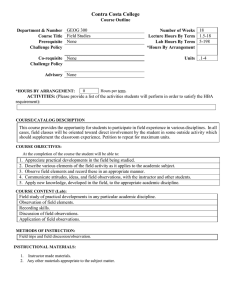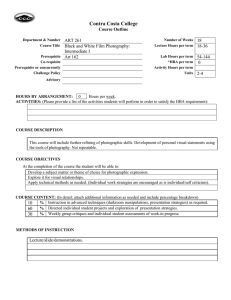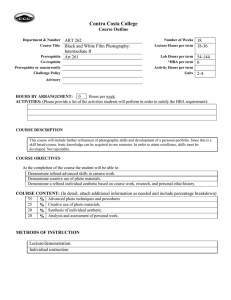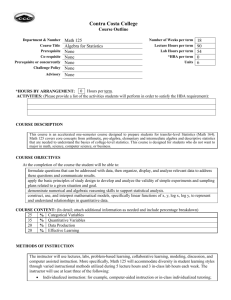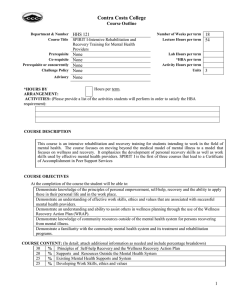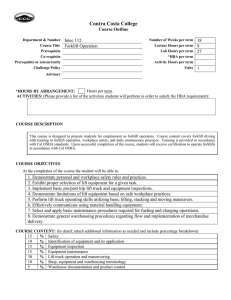HHS 115-S10.doc 79KB Feb 18 2014 10:43:37 AM
advertisement
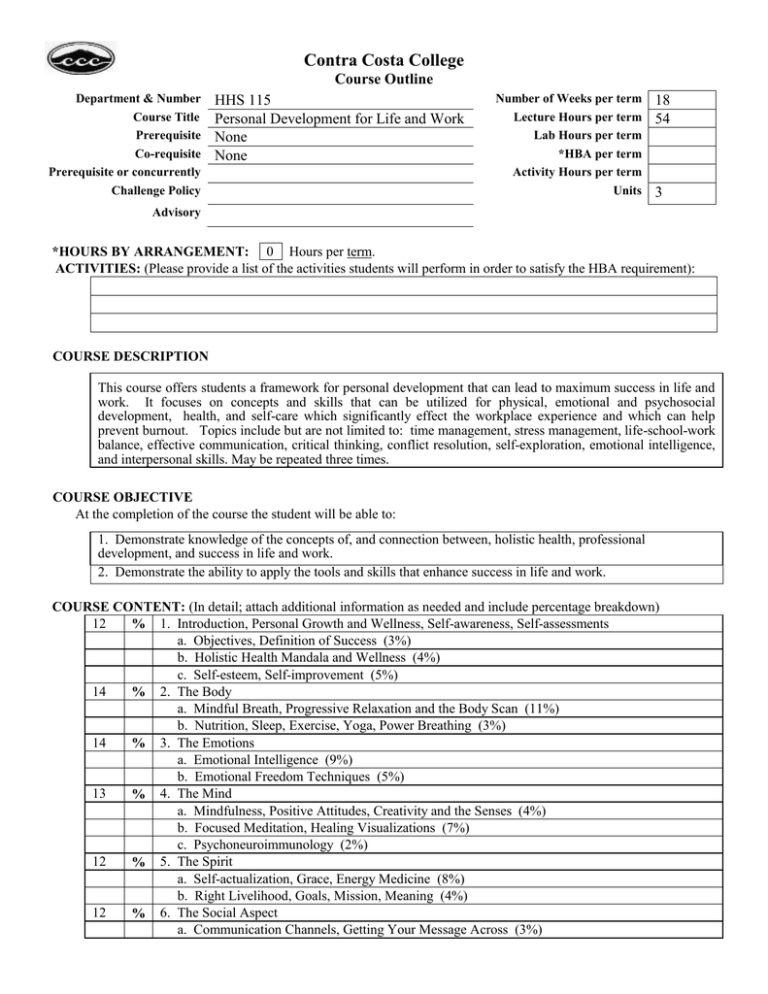
Contra Costa College Course Outline Department & Number Course Title Prerequisite Co-requisite Prerequisite or concurrently Challenge Policy HHS 115 Personal Development for Life and Work None None Number of Weeks per term Lecture Hours per term Lab Hours per term *HBA per term Activity Hours per term Units 18 54 3 Advisory *HOURS BY ARRANGEMENT: 0 Hours per term. ACTIVITIES: (Please provide a list of the activities students will perform in order to satisfy the HBA requirement): COURSE DESCRIPTION This course offers students a framework for personal development that can lead to maximum success in life and work. It focuses on concepts and skills that can be utilized for physical, emotional and psychosocial development, health, and self-care which significantly effect the workplace experience and which can help prevent burnout. Topics include but are not limited to: time management, stress management, life-school-work balance, effective communication, critical thinking, conflict resolution, self-exploration, emotional intelligence, and interpersonal skills. May be repeated three times. COURSE OBJECTIVE At the completion of the course the student will be able to: 1. Demonstrate knowledge of the concepts of, and connection between, holistic health, professional development, and success in life and work. 2. Demonstrate the ability to apply the tools and skills that enhance success in life and work. COURSE CONTENT: (In detail; attach additional information as needed and include percentage breakdown) 12 % 1. Introduction, Personal Growth and Wellness, Self-awareness, Self-assessments a. Objectives, Definition of Success (3%) b. Holistic Health Mandala and Wellness (4%) c. Self-esteem, Self-improvement (5%) 14 % 2. The Body a. Mindful Breath, Progressive Relaxation and the Body Scan (11%) b. Nutrition, Sleep, Exercise, Yoga, Power Breathing (3%) 14 3. The Emotions % a. Emotional Intelligence (9%) b. Emotional Freedom Techniques (5%) 13 % 4. The Mind a. Mindfulness, Positive Attitudes, Creativity and the Senses (4%) b. Focused Meditation, Healing Visualizations (7%) c. Psychoneuroimmunology (2%) 12 % 5. The Spirit a. Self-actualization, Grace, Energy Medicine (8%) b. Right Livelihood, Goals, Mission, Meaning (4%) 12 % 6. The Social Aspect a. Communication Channels, Getting Your Message Across (3%) 13 % 10 % b. Personal Styles, Effective Communication, Active Listening (9%) 7. The Workplace a. Communication to Resolve Conflict, Working with Others, Getting Along with Your Supervisor, Relating to Clients and Customers, Self-Motivation and Self-Management at Work, Standards of Conduct, Getting the Job, Workplace Success (11%) b. Critical Thinking Skills (2%) 8. Life-Work Balancing a. Life-Work Balance, Removing Drains (5%) b. Time and Task Management, Planning and Priorities (5%) METHODS OF INSTRUCTION Lecture, class and group discussions, outside reading assignments, experiential class and home assignments, audio/visual aids INSTRUCTIONAL MATERIALS Reader (to be supplied to bookstore) with the following textbook: Textbook Title: Author: Publisher: Edition/Date: Personal Development for Life and Work Wallace and Masters Cengage Learning 9th ed, 2006 COURSE EXPECTATIONS (Use applicable expectations) Outside of Class Weekly Assignments Hours per week Weekly Reading Assignments 3 Weekly Writing Assignments Weekly Math Problems Lab or Software Application Assignments 3 Other Performance Assignments STUDENT EVALUATION: (Show percentage breakdown for evaluation instruments) 30 20 30 20 % % % % Home assignments Class Participation Exams Final Exam/Final Project GRADING POLICY (Choose LG, CR/NC, or SC) x Letter Grade Credit / No Credit Student Choice 90% - 100% = A 80% - 89% = B 70% - 79% = C 60% - 69% = D Below 60% = F 70% and above = Credit Below 70% = No Credit 90% - 100% = A 80% - 89% = B 70% - 79% = C 6 0% - 69% = D Below 60% = F 70% and above = Credit Below 70% = No Credit Prepared by: Date: Semester/Year Revised 11/02 Julie Shieh-Cook Spring 2010

